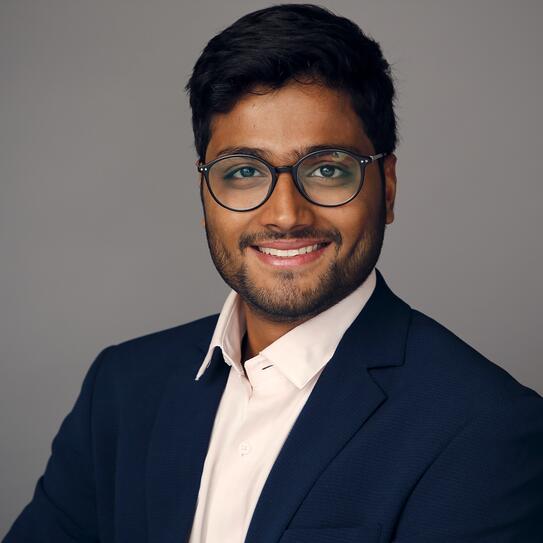Dhruv Singal

Why did you choose to pursue a PhD in your discipline of Business?
I have always been fascinated by research as a career path. Having worked on various technical research projects during my undergraduate years and as a RA at Adobe Research, I was very open to being exposed to complementary fields. When I learned about research opportunities in the business field from a colleague and faculty members, I was hooked on the exciting ways in which the field is able to combine quantitative methods with intuitive insights.
Why did you choose to come to Columbia Business School for a PhD?
Since I had zeroed in on pursuing a PhD in Finance, Columbia Business School was a natural choice, since it is one of the best programs out there. The placement record, great seminars, and the congenial conversations with the faculty only reinforced my belief. The added benefit of being in the center of business – New York City – is another bonus! The logistical support of the program also helped me make my decision, since they are very clear that you can focus on your research without worrying about other mundane issues.
What type of research are you exploring?
Currently, I am working on research at the intersection of macroeconomics, asset pricing, and information economics. Broadly speaking, I am interested in understanding how does income inequality affect various aspects of economic behavior, including credit demand and prices. Untangling how agents from expectations about their labor income fluctuations forms a key part of solving this puzzle. Studying the interplay of labor income risk and broader financial risk is also something that aligns with my areas of interest.
What’s your favorite part of the PhD experience so far?
My favorite part of the PhD experience so far has been the opportunity to present the progress of my research in front of the entire faculty after my second year summer term. While it was a bit nerve-racking to get in front of the professors (albeit over Zoom!), the feedback and encouragement I got from the faculty gave me a much needed boost to pursue my ideas.
Which faculty member(s) and/or courses influenced you the most, and how?
I have been deeply influenced by Professors Stijn Van Nieuwerburgh, Laura Veldkamp, and Neng Wang. Stijn’s course on Empirical Asset Pricing offers a top-to-bottom review of the entire field, through the lens of various seminal papers and hands-on exercises. It was extremely insightful to see him connecting threads across various topics, and emphasizing on understanding the key forces at play. Laura’s course on Information Economics helped us leverage her deep insights on the field to understand how informational frictions are key to understanding workhorse models. Neng’s course on Continuous Time Finance was amazing in how he covered topics ranging from asset pricing, macroeconomics, and corporate finance; and delivered the core intuition of how basic economics comes through in a wide variety of situations.
As a testament to the academic flexibility offered by Columbia Business School, I also took a course at the Economics department with Professor Serena Ng. There, we had the unique opportunity to learn from her own pioneering experience in the field of time-series econometrics.
What has been your academic experience at CBS?
My academic experience at Columbia Business School has been extremely fulfilling and challenging. On the one hand, the seminars and workshops give a unique opportunity to interact with the best minds in the field. On the other hand, the illustrious faculty we have on board helps us tremendously in developing our own research outlook by seeing them work up close. The coursework at CBS is extremely well structured, bringing you to the frontier in the span of a couple of years.
What are your future plans and how has your PhD experience translated into growth in your career?
I plan to pursue a career in research at an academic institution. My PhD experience so far has helped me tremendously in getting closer to that goal. The kind of training offered at CBS is unique in that the coursework and the research seminars complement each other and gear you toward understanding how the field works. The kind of support offered by the faculty only helps reinforce this learning experience. Further, having a great placement record helps students see up close how budding researchers (who happen to be their colleagues) evolve over time, developing maturity in their own research. The encouraging environment has helped me gain a lot of confidence in my career outcomes and has helped me approach the job market with a positive outlook.
What will you take with you from your CBS experience?
I have formed some of the best memories of my life from the CBS experience. Whether it’s grinding together with my cohort to finish up assignments, racing to polishing presentations before seminars, picking the brain of CBS faculty and external speakers, or just talking to MBAs while TA-ing for their class, the CBS experience is exciting in more ways than one!